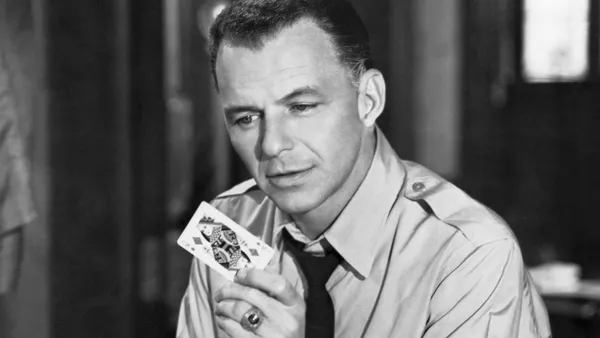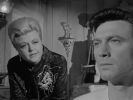Eye For Film >> Movies >> The Manchurian Candidate (1962) Film Review

The Manchurian Candidate is a compelling conspiracy thriller, one that still holds a visceral power 60 years after release. The threat of incipient fascism disguised as a clown and a buffoon drives the film as much as the plot that gives the film its title. There are conspiracies within conspiracies, it may be shot in black and white but it's got plenty of grey areas.
Based on Richard Condon's novel, it features a tremendous assemblage of talent, not least Frank Sinatra. His contributions to the film are significant, not just the use of his private plane. It's probably his finest performance on film, a blend of reserved bonhomie and righteous outrage that would be prototypical for actors like Harrison Ford and George Clooney.

Condon's book was one of several of his filmed, though this and Prizzi's Honor are probably the only ones fondly remembered. It's a taut work, and it's easily read in parallel with the work of Ian Fleming. As Bond (in colour!) was fighting Dr No, this was counter-programming. Not just differently fantastic with their technologies based on the new sciences of the era, chemical psychiatry and reliable rocketry. Their protagonists both have the opportunities to enjoy the finer things in life, fine women, fast wines, vintage cars. Their methods though are very different. While 007 is looser than any cannon, Major Bennett Marco (United States Army) is operating within a system, one harmed in multiple ways by the award of a Medal of Honor to Raymond Shaw.
On a patrol in Korea, Shaw demonstrates exceptional courage, capturing a machinegun nest singlehandedly and using that weapon to rescue his fellow soldiers. The men had been missing in action for days when he led them back. For this, he's awarded America's highest decoration for martial bravery. When interviewed those men describe him as "the kindest, bravest, warmest, most wonderful human being [they]’ve ever known in [their] life."
Each of them says as much, in exactly that many words. They will repeat it whenever asked, in exactly that many words. It's not true either, in exactly that many words. Harvey's performance relies on him being both loathsome and loveable, but the mechanisms of that transformation are various. The consequences of them though, are bleak.
Sinatra is Marco, in that instigating incident in Korea attached to a small unit led by Shaw's lieutenant. Shaw is played by Laurence Harvey, still relatively fresh from Room At The Top, probably his best known other role. Harvey's American accent is a little odd, he was a Briton of Lithuanian origin, but with Kennedy's Kennebunkport Pronunciations in the White House it readily slides. Janet Leigh is the variously named Rosie, one might call her Marco's love interest but it's more complicated than that. Shaw has one too, Leslie Parrish's Jocelyn Jordan. It's a match not approved of by his mother, Angela Lansbury as Eleanor Iselin. That different surname is because she's remarried, the aspirant Senator Iselin (James Gregory). Lansbury's not just the power behind the throne, but an absolute powerhouse. She's given absolute reign here, to great effect.
Lansbury's another Briton in the cast. It's notable that she's just three years older than Harvey. Their chemistry is important to the film and the plot, and that proximity is one of the things that adds depth to proceedings.
Murky depths at that. George Axelrod had several adaptations to his credit as scriptwriter, he was here fresh from Breakfast At Tiffany's. He'd later adapt a Ludlum and a Forsyth that were firmly in a similar pattern of The Conspiracy Thriller based on a pattern of The Adjective Noun. In a film filled with expository dialogue he borrows Condon's text and adds to it. Director John Frankenheimer was rarely better. His background in television is reflected not just in the speed of production but in actual televisual moments. There's a scene with screens that are showing, simultaneously, the coverage of a committee hearing and its interruption by the crusading Senator Iselin. It's one of many moments of overlap. Sometimes it is achieved by superimposition, often its through careful composition of shots.
Frankenheimer wouldn't hit these heights again for a while, I'd argue that it wasn't until Ronin that he managed something that was both as clockwork and kinetic. Even in Grand Prix, which made use of interior shots for speed as this film does. Not all of that can be laid upon him. I don't think anyone could have played the hand he was dealt with The Island of Doctor Moreau. Black Sunday is of a similar ilk, but it's now most notable as the Thomas Harris that doesn't feature Hannibal.
Care is evident everywhere. There's plenty of location shooting, including in an icy Central Park. It's not possible to tell which sets are real and which are borrowed, but that measure of artificiality and reality is key to film's plot. The juxtaposition of a ladies society talking about flowers and what it conceals still strikes. The opening sequence establishes the fate of that patrol quickly before the credits. An early cut ran those credits over the ambush but this is one of the few places where the film did more with less. There's a fight where Sinatra's commitment resulted in a genuinely broken finger, and while the restrictions of the era limit how much sex and violence can feature that forces it to be subtle, and the stronger for it. Frankenheimer has talked about how the film's body count forced invention in its depiction, and he milks variety for all its worth.
The most (in)famous scene of this is probably one in which Sinatra isn't properly in focus. To audiences in their homes it's barely evident, even on a crisp DVD transfer on a high resolution TV. On a big screen, however, it enraptured audiences, became in its own way an illusion of perspective. Though it was remade in 2004, I don't think that comes anywhere close to capturing the magic of this version. Even in the context of its rigged decks it never forces its way to the end it is building too, instead it is a consequence of patience, of effort. Solitaire efforts can do much, but film is a product of combinations, even of luck. The Manchurian Candidate is worth giving a chance.
Reviewed on: 25 Feb 2022

















